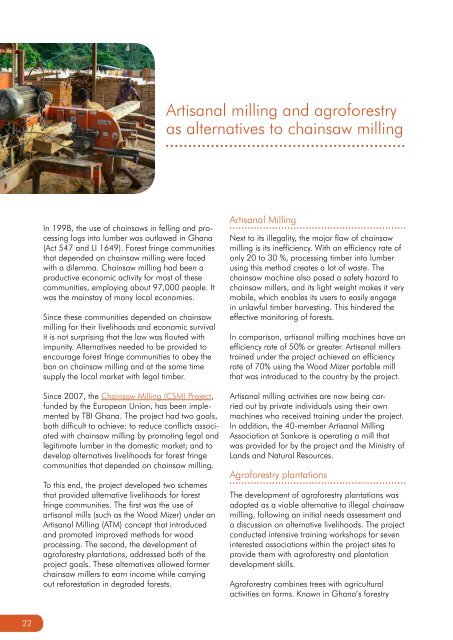timber sector
ar2015-web-markets
ar2015-web-markets
You also want an ePaper? Increase the reach of your titles
YUMPU automatically turns print PDFs into web optimized ePapers that Google loves.
Artisanal milling and agroforestry<br />
as alternatives to chainsaw milling<br />
In 1998, the use of chainsaws in felling and processing<br />
logs into lumber was outlawed in Ghana<br />
(Act 547 and LI 1649). Forest fringe communities<br />
that depended on chainsaw milling were faced<br />
with a dilemma. Chainsaw milling had been a<br />
productive economic activity for most of these<br />
communities, employing about 97,000 people. It<br />
was the mainstay of many local economies.<br />
Since these communities depended on chainsaw<br />
milling for their livelihoods and economic survival<br />
it is not surprising that the law was flouted with<br />
impunity. Alternatives needed to be provided to<br />
encourage forest fringe communities to obey the<br />
ban on chainsaw milling and at the same time<br />
supply the local market with legal <strong>timber</strong>.<br />
Since 2007, the Chainsaw Milling (CSM) Project,<br />
funded by the European Union, has been implemented<br />
by TBI Ghana. The project had two goals,<br />
both difficult to achieve: to reduce conflicts associated<br />
with chainsaw milling by promoting legal and<br />
legitimate lumber in the domestic market; and to<br />
develop alternatives livelihoods for forest fringe<br />
communities that depended on chainsaw milling.<br />
To this end, the project developed two schemes<br />
that provided alternative livelihoods for forest<br />
fringe communities. The first was the use of<br />
artisanal mills (such as the Wood Mizer) under an<br />
Artisanal Milling (ATM) concept that introduced<br />
and promoted improved methods for wood<br />
processing. The second, the development of<br />
agroforestry plantations, addressed both of the<br />
project goals. These alternatives allowed former<br />
chainsaw millers to earn income while carrying<br />
out reforestation in degraded forests.<br />
Artisanal Milling<br />
Next to its illegality, the major flaw of chainsaw<br />
milling is its inefficiency. With an efficiency rate of<br />
only 20 to 30 %, processing <strong>timber</strong> into lumber<br />
using this method creates a lot of waste. The<br />
chainsaw machine also posed a safety hazard to<br />
chainsaw millers, and its light weight makes it very<br />
mobile, which enables its users to easily engage<br />
in unlawful <strong>timber</strong> harvesting. This hindered the<br />
effective monitoring of forests.<br />
In comparison, artisanal milling machines have an<br />
efficiency rate of 50% or greater. Artisanal millers<br />
trained under the project achieved an efficiency<br />
rate of 70% using the Wood Mizer portable mill<br />
that was introduced to the country by the project.<br />
Artisanal milling activities are now being carried<br />
out by private individuals using their own<br />
machines who received training under the project.<br />
In addition, the 40-member Artisanal Milling<br />
Association at Sankore is operating a mill that<br />
was provided for by the project and the Ministry of<br />
Lands and Natural Resources.<br />
Agroforestry plantations<br />
The development of agroforestry plantations was<br />
adopted as a viable alternative to illegal chainsaw<br />
milling, following an initial needs assessment and<br />
a discussion on alternative livelihoods. The project<br />
conducted intensive training workshops for seven<br />
interested associations within the project sites to<br />
provide them with agroforestry and plantation<br />
development skills.<br />
Agroforestry combines trees with agricultural<br />
activities on farms. Known in Ghana’s forestry<br />
22


